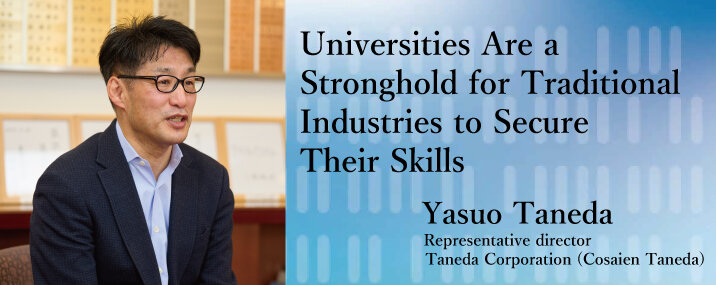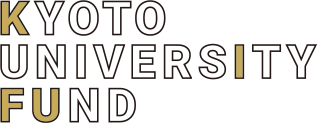Vol.30 Interview with Donors

Yasuo Taneda
Born in Nara Prefecture in 1967. After graduating from the Faculty of Pharmaceutical Sciences, Kyoto University in 1991 and graduating from the Graduate School of Pharmaceutical Sciences, Kyoto University in 1993, he worked for a pharmaceutical company, developing diabetes and AIDS drugs. After marrying in 1998, he has been working in his wife's family business. In 2011, he incorporated the company and assumed the position of representative director.
Q What were your days at Kyoto University like?
I was a Kyoto University student in the midst of the bubble era, filled with the exuberance of the golden age of the American football team. Many students were flamboyant, driving around in their cars. As a student who entered Kyoto University after spending another year preparing for the entrance examinations after graduating from high school, I asked my former classmates, who had enrolled directly out of high school, how to efficiently earn credits, and I enjoyed participating in club activities.
After joining the pharmaceutics laboratory, things changed drastically and I became busier. I often changed samples every 90 minutes throughout the night to collect data. I was able to experience things at a high level as an undergraduate student, including a conference presentation at the end of my senior year.
Actually, I discovered my unexpected ability at Kyoto University. I guess you could call it management skills. I negotiated with bus companies and lodges to obtain discounts for my tennis circle's training camp. When we went to Ise on a laboratory trip, I even rented a boat for a professor who loved boats and had a pearl diver perform a demonstration. I do not mean to brag but I believe that my planning and negotiation skills were outstanding.
Q How did you enter the world of Kyo-kanoko shibori (tie-dyed fabric
made in Kyoto) after working for a pharmaceutical company
after graduation?
I started working at the JT Central Pharmaceutical Research Institute established by Japan Tobacco Inc. and from the time I was a new employee, I was in charge of high-priority research themes and went abroad, which was also a valuable experience.
When I got married, I resigned in order to join my wife's family business, a long-established manufacturer of Kyo-kanoko shibori. Perhaps because of my youth, I did not hesitate to jump into a completely different world, and I thought I could do anything.
During my time at the institute, I was promoted ahead of my peers because I was recognized for my negotiating skills, such as putting together contracts. So the power I discovered while I was a student at Kyoto University was put to good use. So perhaps I had the feeling that I was better off doing that than continuing to work as a researcher.
Nevertheless, after joining the company, I realized how difficult the textile industry can be. The aging of craftsmen and the shortage of successors is a serious issue, and the number of domestic production sites is decreasing. To keep the company going, it is necessary to both increase sales and maintain the number of production sites.
Q What are your goals for the future?
It is all about preserving the technique of Kyo-kanoko shibori. Our company was founded as a hair accessory shop and has continued to this day by evolving into a kimono accessory shop. So, the items to be manufactured should be changed in line with the times.
However, the technique of shibori (tie-dyeing) is difficult and involves a lot of manual work. We have been promoting partial mechanization within our company, and there is one thing we are hoping for as a way to take advantage of this. It is collaboration between traditional industries and welfare, which is something Kyoto City is working on. We have had people with various disabilities, including developmental disabilities, experience the technique of tie-dyeing and were amazed at their abilities. Their work is careful and precise, and their concentration and persistence are amazing.
The works of the Edo period were so wonderful that I had almost given up hope that our technology would be able to keep up with them, but now I have hope. If efforts like the collaboration between traditional industries and welfare can spread throughout society, allowing us to use the abilities of people with disabilities, we may be able to preserve certain traditional skills for future generations. We will not change the basics, such as technology, but we will change what we can and survive at all costs.
Meanwhile, as a new area of business, we are preparing to manufacture and sell Kyoto brand cosmetics. We were selected for a business restructuring subsidy, and because of my pharmacist license, we were also able to obtain a cosmetics manufacturing and sales business license. I am at the point where the lessons learned in the past have finally led me to the present.
At the same time, through the activities of the Kyoto Traditional Products Association (Kyoto Noren-kai), of which I have been a board member for more than a decade, I would like to do my best to promote the appeal of traditional Kyoto products, such as tie-dyeing.
Q What kind of efforts do you look forward to seeing Kyoto University
make, and is there a message you want to leave Kyoto
University students with?
A book published more than 40 years ago by Professor Mitsukuni Yoshida of Kyoto University, titled Kyo-kanoko Bi to Dento (Kyo-kanoko Beauty and Tradition) is valuable as an industrial history book, but such records and research are few and far between. Textile departments that study silk, once considered world-class in quality and technology, are disappearing. However, because the university is located in Kyoto, I would like Kyoto University to be a center for research on traditional industries and a guarantee of technology.
Encounters and experiences with a diverse range of people are what lead to flexible thinking. I feel that college students these days are too serious and lack a sense of fun. I encourage students to value encounters and experiences while they are still students and challenge themselves outside the box. Doing so will surely lead to the future.
(Interviewed in December 2021)


